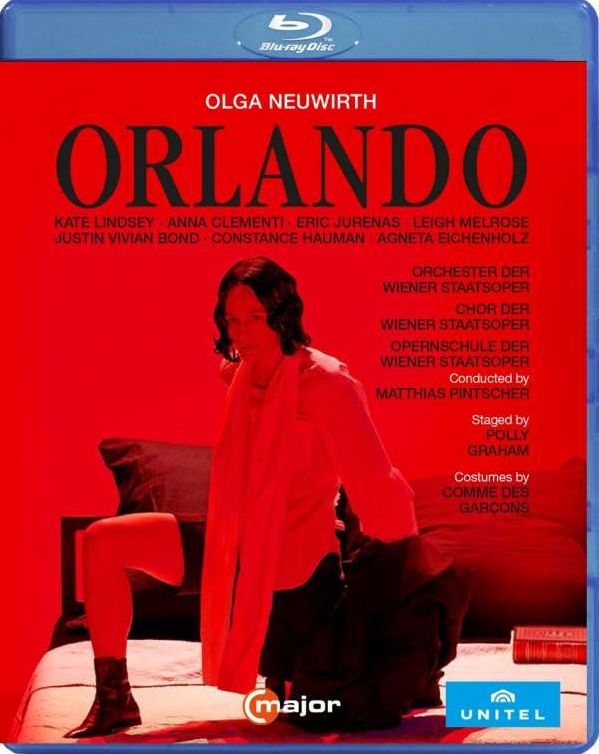NEUWIRTH Orlando (Pintscher)
View record and artist detailsRecord and Artist Details
Genre:
Opera
Label: C Major
Magazine Review Date: 06/2022
Media Format: Digital Versatile Disc
Media Runtime: 173
Mastering:
DDD
Catalogue Number: 760804

Tracks:
| Composition | Artist Credit |
|---|---|
| Orlando |
Olga Neuwirth, Composer
Agneta Eichenholz, Sasha; Chastity, Soprano Anna Clementi, Narrator, Speaker Carlos Osuna, Addison, Tenor Christian Miedl, Pope, Baritone Constance Hauman, Queen; Purity; Friend of Orlando’s Child, Soprano Eric Jurenas, Guardian Angel, Countertenor Justin Vivian Bond, Orlando’s Child, Cabaret singer Kate Lindsey, Orlando, Mezzo soprano Leigh Melrose, Shelmerdine; Greene, Baritone Marcus Pelz, Dryden, Bass-baritone Margaret Plummer, Modesty, Mezzo soprano Matthias Pintscher, Conductor Vienna State Opera Chorus Vienna State Opera Orchestra Wolfgang Bankl, Duke, Bass |
Author: Tim Ashley
Filmed during its opening run, Olga Neuwirth’s Orlando was the first full‑length opera by a female composer to be performed at the Vienna Staatsoper. With an English libretto by American playwright Catherine Filloux and Neuwirth herself, it’s an adaptation of Virginia Woolf’s gender-bending novel, about an ageless poet’s journey through literary and political history during the course of which he changes from male to female, though Neuwirth and Filloux freely adapt and expand the book’s narrative.
The basic premise remains the same. Orlando begins his career as an aristocrat at the court of the ageing Elizabeth I, faces erotic disappointment in his encounter, during the great frost of 1608, with the enigmatic Sasha and transitions to a woman in the late 17th century, after which she finds the avenues of literary creativity closed to her by the male establishment, forcing her to venture on her own voyage of self-discovery in order to achieve aesthetic and personal recognition. Woolf’s emphasis on the fluidities of desire and gender is maintained but there are differences in plot and detail. Orlando’s husband Shelmerdine is a photographer, not a sea captain. Where Woolf ends her novel in October 1928, the date of publication, Neuwirth and Filloux bring it forwards to the time of the premiere, allowing Orlando to be a witness to the Second World War as well as the First, the revolutionary counterculture of the 1960s, the emergence of feminism, gay and trans rights, and the shift to the political right in Trump’s America. Shelmerdine, who photographs the world that Orlando writes about, is killed in the Iraq War, and their Child, a son in the novel, is now a trans non-binary cabaret artist.
Neuwirth’s score is eclectic, ranging over styles, time and space. The forces are vast, involving nearly 40 solo performers, instrumental as well as vocal, multiple choruses and a large orchestra. Allusions to everything from Renaissance madrigals and Purcell to Abide with me and The Rite of Spring are woven into a shifting, seething texture that batters at musical boundaries by incorporating jazz, cabaret and rock, much as the narrative tears down gender stereotypes. Time and history whirl past in the propulsive interludes that link the work’s 19 scenes, and pause in Orlando’s reflective monologues and lyrical duets with husband, lovers and literary colleagues. Once we part company with Woolf’s narrative, however, the dramaturgy turns episodic and wearing as contemporary issues are effectively ticked off in turn. And you can’t help but feel that Neuwirth’s inspiration begins to flag 30 or so minutes from the end.
The title-role, one of the longest and most exacting ever written, is taken by Kate Lindsey in a staggering performance, without which the work is almost unthinkable. Neuwirth keeps her in her lower registers as the male Orlando, freeing the top of her voice with airy coloratura after she becomes a woman: later come Sprechstimme and growling rock songs with a microphone. There are fine performances elsewhere, too. Leigh Melrose is double cast, dreamily lyrical as Shelmerdine and waspishly cynical as Greene, Orlando’s fiercest critic. Agneta Eichenholz makes a nicely sensual Sasha – one wishes the role were bigger – while Constance Hauman brings dignified majesty to the ageing Queen Elizabeth. Diseuse Anna Clementi is the Narrator, to some extent Orlando’s alter ego, and trans singer Justin Vivian Bond does fine things with the Child’s big second-act number. Matthias Pintscher’s conducting has wonderful assurance. Playing and choral singing are both excellent.
Polly Graham’s staging, meanwhile, is at once stylish and stylised. History unfolds in the videos, strikingly designed by Will Duke, that stream across the panels of Roy Spahn’s set. The costumes, all padded silks and ruffles, are by Rei Kawakubo from Comme des Garçons: her postmodern riffs on Elizabethan and 18th-century dress are particularly good. Even though there is a bewildering welter of detail at times, Graham keeps the narrative focus taut and clear. It’s a fine piece of theatre, admirably serving a work of tremendous ambition and scope, despite its flaws.
Discover the world's largest classical music catalogue with Presto Music.

Gramophone Digital Club
- Digital Edition
- Digital Archive
- Reviews Database
- Full website access
From £8.75 / month
Subscribe
Gramophone Full Club
- Print Edition
- Digital Edition
- Digital Archive
- Reviews Database
- Full website access
From £11.00 / month
Subscribe
If you are a library, university or other organisation that would be interested in an institutional subscription to Gramophone please click here for further information.




